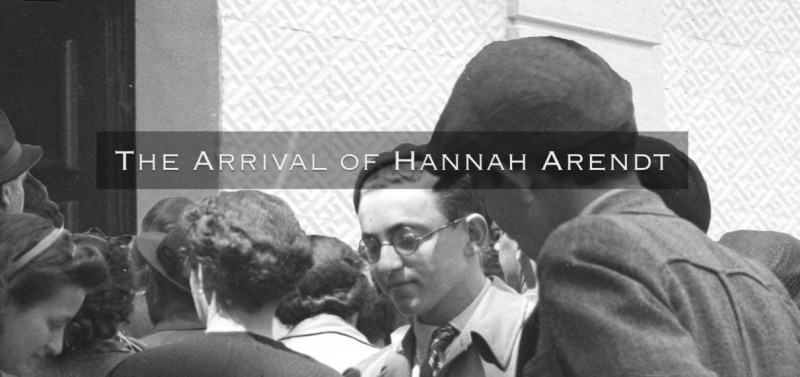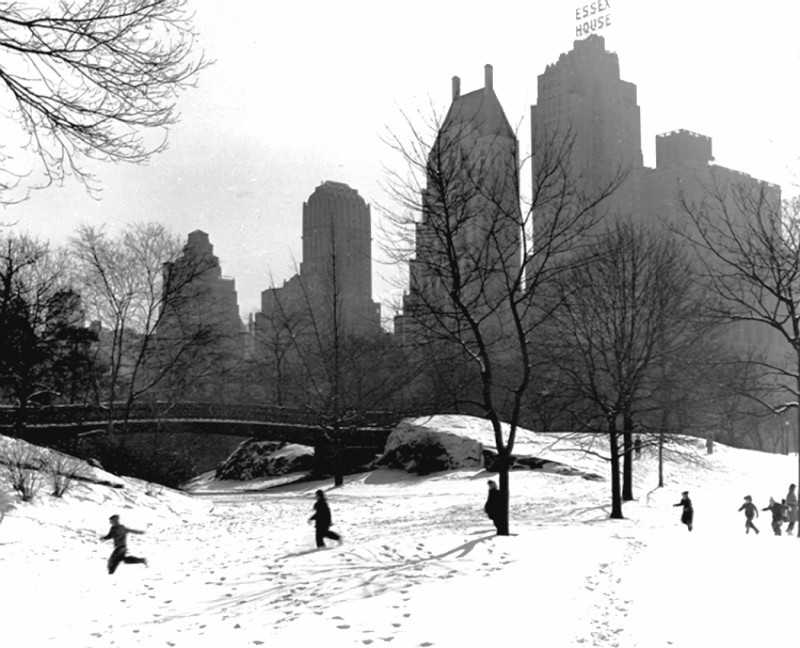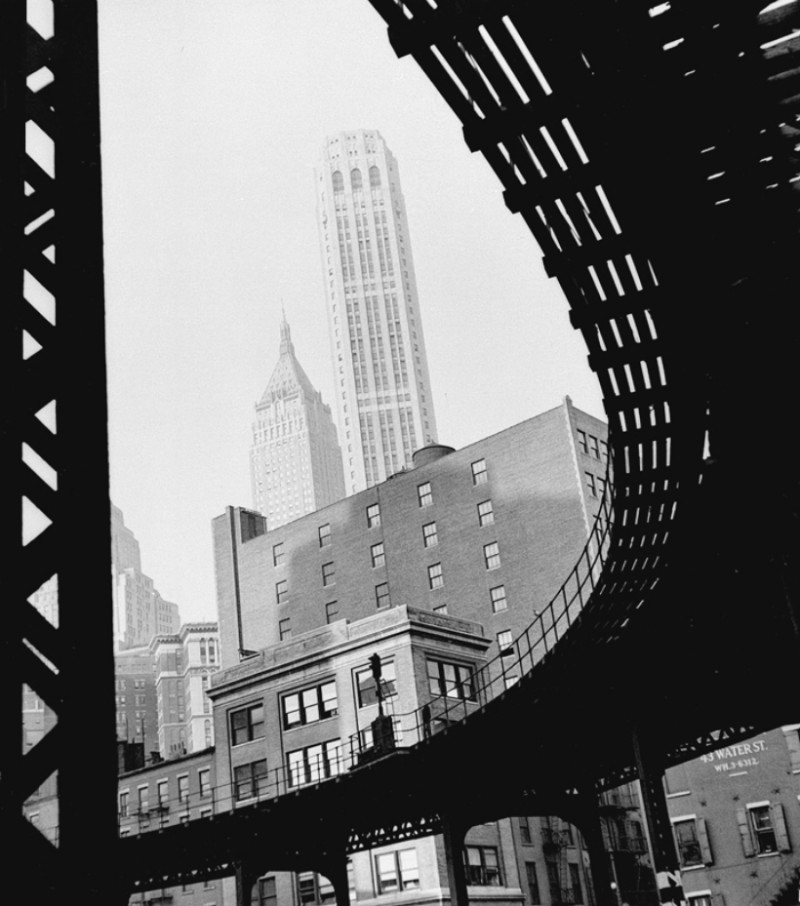
The Arrival of Hannah Arendt
This film describes the arrival of Hannah Arendt - a Jewish, German-American political theorist and publicist - in New York and her reflections on flight and helping people start over.

Ich bin am zweiten Tag zur amerikanischen Gesandtschaft gegangen: Das ist kein Leben, wir müssen weg! Die Nazis hatten eine große Kunst, unglaubliche Forderungen zu stellen an Papieren und was man erledigen muß, welche Erlaubnisse, welche Ämter und welche Bescheinigungen…das hat Wochen gedauert. Man mußte sich Nächte anstellen. Dann hat man ein Papier gekriegt, das nur drei Wochen gültig war. Das ist manchmal abgelaufen, bis man zum nächsten gekommen ist. Und die haben uns eine Taxe aufgelegt und gesagt, ihr seid so und soviel Geld schuldig, ihr könnt nicht weg, bevor bezahlt ist. Das Geschäft war bereits gesperrt. Wir hatten kein Einkommen mehr. Mein Vater war bereit, seine wunderschöne Sammlung, wertvolle Sammlung aufzugeben, damit wir rauskönnten. „Und wenn ich nur mit meinem Anzug gehe, ich will leben. „Ist aufs Rathaus gegangen: Wir möchten raus. Kommt in unser Haus, nehmt alles, was ihr wollt. But, laßt uns gehen. Es war eine monatelange Quälerei. Der Terror in Österreich hat ja wahnsinnig schnell begonnen. Viel stärker als in Deutschland. Viel stärker, augenblicklich. Ist ein Punkt gekommen, wo meine Eltern sehr gedrungen haben, daß wir zwei Jungen raus sollten. Wir hatten Gerüchte gehört, daß wenn man nach Köln geht, damals wurde doch der Siegfried-Wall dort gebaut, zwischen Aachen und Köln, daß man dort Beziehungen haben kann, die Gestapo schmieren, und die bringen einen mit dem Wagen durch den Siegfried- Wall nach Belgien oder Holland. Und das haben wir versucht, mein Bruder und ich. Wir haben uns auf den Weg nach Köln gemacht, wir haben die Beziehung gekriegt zur Gestapo. In einer jüdischen Konditorei. Wir haben das Geld gezahlt, wir wurden von dem Gestapomann in dem kleinen Mercedes abgeholt, wir fuhren bis zu einem kleinen Dorf, das halb holländisch, halb deutsch war.
Da gab es so ein Spiel, das haben die Schweiz, Holland und viele gemacht. Wenn Sie das Innere des Landes erreicht haben, haben Sie Exilrechte gekriegt. Aber, wenn Sie an der Grenze erwischt worden sind, hat man Sie zurückgestoßen. Das ist uns in Holland passiert. Sind unter Fußtritten der holländischen Polizei zurückgetrieben worden. In die Hände der deutschen Polizei. Die hat die Gestapo angerufen. Aber der Mann bei der Gestapo muß besoffen gewesen sein, oder er war im Moment zu beschäftigt, er hat gesagt: Jagt sie weg, aber wenn sie jemals wiederkommen, sind sie in Dachau. Mein Bruder und ich wandelten durch den Siegfried-Wall nach Köln zurück, es war genau der Tag des Münchner Vertrages. Wir riefen unsere Eltern an, und die sagten: Kommt zurück! Es ist ein Affidavit von Amerika für die ganze Familie da. So sind wir nach Wien zurück. Die erste Sorge war, wegzukommen, denn so viele junge Leute wurden erschlagen.
[…] Wir sind weggefahren mit zwei, drei neuen Anzügen und neuen Schuhen und neuen Hemden und zehn Dollar und bezahlten Schiffskarten. Ich hatte den sogenannten deutschen Paß mit dem roten „J“. Ich bin angekommen Neujahrsabend thirtyeight-thirtynine und drei Monate später meine Eltern.
Wie war denn die Stimmung unter den Emigranten, auf dem Schiff?
Es war eine Mischung von Freude, daß man dabei war, und furchtbar schlechtem Gewissen, daß man Freude empfinden konnte, während so viele zurückgeblieben waren.
Dann, die Ankunft in New York- wie war das?
Es war ein großes Erlebnis. Wir wußten, wir hatten dieses grandiose Affidavit. Aber dann wurden wir in ein kleines Hafenschiff gesetzt, und es ging tschok, tschok, tschok den Hudson rauf nach Ellis Island. Das war damals noch das proverbial Ellis Island, wo tausend Leute rumsaßen, aus allen Ecken der Welt. Da war wirklich alles vertreten. Mein Bruder und ich kommen da rein- und sehen Eisenstangen vor den Fenstern, und dahinter New York, das Profil von New York! Wir waren zerschmettert. Ich blieb stehen und sagte zu meinem Bruder: Na schön, von einem Gefängnis ins andere. Und da kam ein New Yorker policeman, schaut uns an und beginnt in fließendem jiddisch uns zu erklären, daß wir nicht Gefangene sind, daß schon alles gut wird. Die Tatsache, daß eine Uniform jiddisch gesprochen hat, war so… almost komisch, wir konnten’s uns überhaupt nicht vorstellen. Wir waren ja geistig geregelt: Verboten! Alles, was Uniform, was Autoritär ist, war gefährlich. Ich konnte nicht so viel verstehen, Jiddisch ist ja eine eastern-european Sprache, aber doch genug. Was er gesagt hat, ich hab’s vergessen, aber es hat uns beruhigt.

I went to the American legation on the second day: This is no life, we must leave! The Nazis had a great art of making unbelievable demands for papers and what you had to do, what permits, what offices and what certificates…it took weeks. One had to queue up for nights. Then you got a paper that was only valid for three weeks. Sometimes it expired until you got to the next one. And they put a tax on us and said, you owe so and so much money, you can’t leave until it’s paid. The business was already closed. We had no more income. My father was willing to give up his beautiful collection, valuable collection, so that we could get out. “And if I just go with my suit, I want to live. “Has gone to the town hall: We want to get out. Come to our house, take everything you want. But, let’s go. It was a months-long torment. The terror in Austria started insanely fast. Much stronger than in Germany. Much stronger, instantly. There came a point where my parents were very insistent that we two boys should get out. We had heard rumors that if you go to Cologne, at that time the Siegfried Wall was built there, between Aachen and Cologne, that you can have connections there, bribe the Gestapo, and they will take you by car through the Siegfried Wall to Belgium or Holland. And that’s what we tried to do, my brother and I. We made our way to Cologne, we got the relationship with the Gestapo. In a Jewish pastry shop. We paid the money, we were picked up by the Gestapo man in the little Mercedes, we drove to a little village that was half Dutch, half German.
There was a game that Switzerland, Holland and many other countries played. If you reached the inner of the country, you got exile rights. But if you were caught at the border, you were pushed back. That’s what happened to us in Holland. We were driven back kicking by the Dutch police. Into the hands of the German police. They called the Gestapo. But the man at the Gestapo must have been drunk, or he was too busy at the moment, he said: chase them away, but if they ever come back, they are in Dachau. My brother and I walked back through the Siegfried Wall to Cologne, it was exactly the day of the Munich Treaty. We called our parents, and they said: Come back! There is an affidavit 11The affidavit is a declaration of guarantee with which citizens and organizations in a host country, for example the USA, could help in obtaining entry permits for persecuted persons in Nazi Germany and the territories. from America for the whole family. So we went back to Vienna. The first concern was to get away, because so many young people were slain.
[…] We left with two or three new suits and new shoes and new shirts and ten dollars and paid ship tickets. I had the so-called German passport with the red “J”. I arrived New Year’s Eve thirtyeight-thirtynine and three months later my parents.
What was the mood like among the emigrants on the ship?
It was a mixture of joy that one was there and terribly bad conscience that one could feel joy while so many had stayed behind.
Then, the arrival in New York- what was that like?
It was a great experience. We knew we had this grandiose affidavit. But then we were put on a little harbor boat and it went chop, chop, chop up the Hudson to Ellis Island. At that time, it was still the proverbial Ellis Island, where a thousand people from all corners of the world sat around. Everything was represented there. My brother and I come in there and see iron bars in front of the windows, and behind them New York, the profile of New York! We were shattered. I stopped and said to my brother: All right, from one prison to another. And there came a New York policeman, looks at us and starts explaining in fluent Yiddish that we are not prisoners, that everything will be all right. The fact that a uniform spoke Yiddish was so… almost comical, we couldn’t imagine it at all. After all, we were mentally regulated: Forbidden! Everything that is uniform, that is authoritarian, was dangerous. I could not understand so much, Yiddish is an Eastern European language, but enough. What he said, I forgot, but it calmed us down.
Leo Glueckselig was born in 1914 in Vienna, in the 2nd district. In 1938, immediately after the “Anschluss” of Austria to the Reich, Glueckselig finished his studies in architecture at the School of Applied Arts in Vienna. Initially arrested during the Novemberprogrom, he was able to escape to New York on January 1, 1939. His family followed a short time later. In 1941, with the entry of the United States into the war, Leo Glueckselig became a soldier and fought on various fronts in the Pacific. In 1945, at the end of the war, he returned to the United States. He worked as a freelance illustrator and draftsman for book and magazine publishers and lived in a small apartment in Manhattan, New York.
In his conversation with the author of the book “Die verheissene Stadt” Thomas Hartwig, Leo describes his emigration from Austria and arrival in New York.
Thomas Hartwig, Achim Roscher, 1986: Verheißene Stadt: Deutsch-jüdische Emigranten in New York. Gespräche, Eindrücke und Bilder. Berlin: Das Arsenal. pp.65,68, 70-71.
Translation from German to English © Minor Kontor / We Refugees Archive.